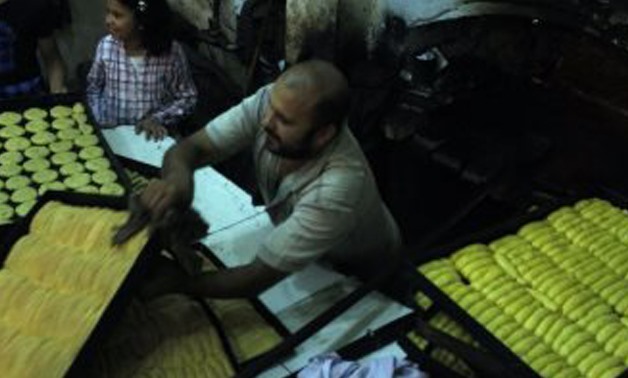
photos of Egyptians with trays of Kahk in front of the backery- File Photo
CAIRO – 21 June 2017: Ramadan is about to end and Muslims around the world are ready to celebrate the festival of Eid al-Fitr. If you are Egyptian or your Egypt visit coincides with Eid, what follows is an explanation on how Egyptians celebrate the feast of Eid al-Fitr.
Eid al-Fitr is a three day holiday in Egypt. The word Eid is an Arabic word that means a festivity, a celebration, a recurring happiness, and a feast. In Islam, there are two major Eids, namely Eid al-Fitr (Festival of Breaking the Fast) celebrating the end of Ramadan and Eid al-Adha (Festival of Sacrifice) which coincides with the Hajj and commemorates Prophet Abraham’s sacrifice of a sheep in place of his son Ishmael. Eid al-Fitr is celebrated by Muslims after fasting in the month of Ramadan as a matter of thanks and gratitude to God.
For Egyptians the word has a deeper meaning and rings many bells. If the word Eid is mentioned before an Egyptian adult he will recall that pervasive delightful scent of the cookies his mother used to bake before the feast and clings to the house and the memory, the gathering of the family, neighbors, and friends under one roof with the aim of making Kahk.
During Eid el-Fitr family gatherings involve cooking and eating all kinds of Egyptian food, but the item most associated with Eid al-Fitr are 'Kahk' which are cookies filled with nuts and covered with powdered sugar.
Egyptians either bake Kahk at home or buy it at the bakery. Thus, a bakery crowded in the last few days of Ramadan with Kahk buyers is a common scene. In the past years, it was easier for families to buy Kahk and save the effort of baking. Nowadays, due to the inflation, and given the high prices of Kahk, some Egyptian families prefer to bake Kahk at home to cut costs.
Increased prices of Kahk ingredients did not stop Egyptians from celebrating their feast although they are using less amounts of flour and bake fewer trays at the bakery for higher prices.
TV in Egypt celebrates Eid, too, with a continuous marathon of movies as well as programs featuring live interviews from all over Egypt of both public figures and everyday citizens, sharing their Eid celebrations.
“Eid Mubarak” or blessed Eid is the most general greeting that one receives or gives. People consider it a must to visit families on the first day of Eid; hence they have next two days in which they can enjoy by visiting places like parks, cinemas, beaches or theatres. Some people go on a tour or on a cruise on the Nile river. Throughout Eid children wear new clothes provided to them.
The Eid day starts with a small snack followed by Eid Prayers (Salat al-Eid) in a congregation attended by men, women and children followed by a short speech reminding Egyptians of the qualities and good actions they should practice and perform while dealing with others and even strangers at time of Eid and the rest of the year.
Afterwards neighbors, friends and relatives start greeting each other. The most common greeting is "Eid Mubarak" (Have a blessed Eid). Children are the luckiest in this occasion; it is customary for them to receive a "Eidyah" from their grown-up relatives.
This is a small sum of money that the children receive, to spend on all their activities throughout the Eid. Also, women (particularly mothers, wives, sisters and daughters) are commonly given special gifts by their loved ones.

Comments
Leave a Comment